China ACG Culture
China’s eSports Craze Reaches New Heights with the Victory of “Invictus Gaming” (IG)
The hashtag “IG are the Champions” received over a billion million views on Weibo over the past week.
Published
6 years agoon
By
Gabi Verberg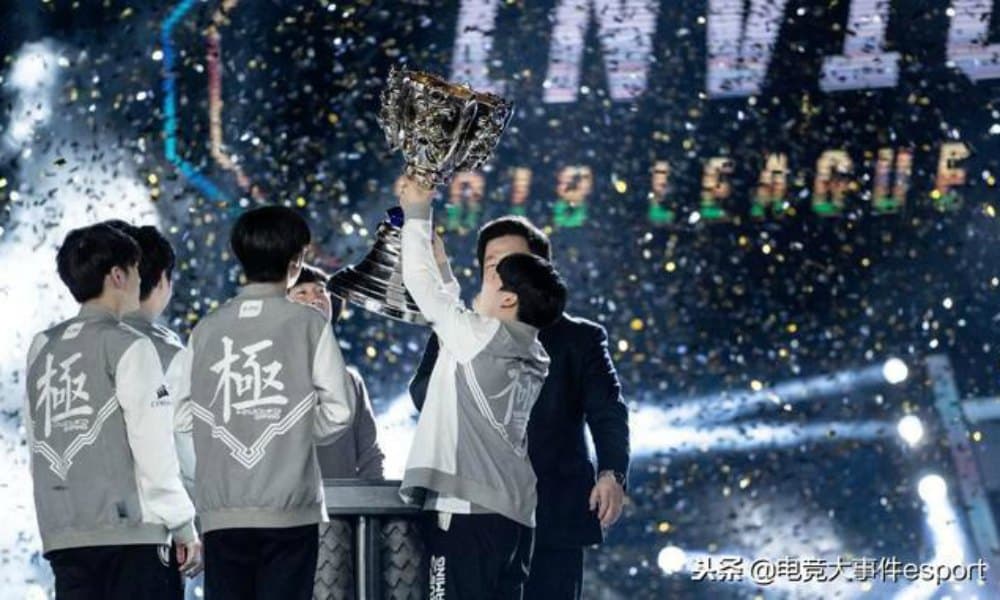
Over the past week, hotlists of Baidu and Weibo were dominated by the news of China’s IG team winning the League of Legends (英雄联盟) World Championship for the first time in world history. Following China’s success at the previous Asian Games, China’s electronic-sports (esports) craze has now reached new heights.
In early November, ‘Invictus Gaming’ (IG) became the first Chinese team to win the League of Legends World Champions.
In a sold-out Munhak Stadium in Incheon, South Korea, the Chinese team took down Europe based FNATIC by 3-0 on November 3rd.
League of Legends is an online multiplayer video game developed and published by Riot Games in 2009 in which a team of players has to battle against the opposing team by gaining more strength through the accumulation of items and experience over the course of the game.
College Craze over IG
During the finals and in the days that followed, the internet flooded with reactions from esports enthusiasts. On Weibo, hashtags such as “IG are the Champions”(#ig冠军#)and “What the championship of IG means” (#IG夺冠的意义#) went viral, together scoring more than 1,5 billion views. IG’s World Championship has shown, more than ever, how booming esports actually are in China.
During the finals, many photos and videos of school canteens, sports field and internet café’s full of young people watching the final circulated on the internet.
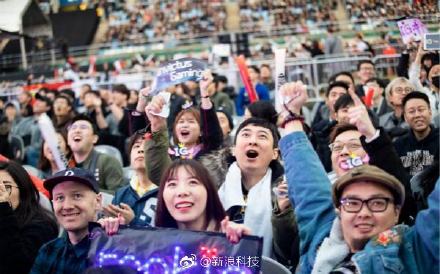
Right after IG defeated FNATIC, videos posted online by students of the Nanchang Institute of Technology, Tianjin Institute of Technology, and many other universities showed countless dormitory rooms with students celebrating, cheering and chanting “IG are the Champions!” (IG冠军!).

At one university, several students even put up a banner reading: “If IG wins the championship, Unit 310 goes naked” (“IG夺冠!310集体裸奔”). Photos and videos later confirmed that some people partly held themselves to the agreement, showing young men wearing nothing but their underwear running around holding the IG’s flag.
Over the past week, photos of banners hanging from university dormitories, congratulating IG, also spread online – showing a craze that is similar to that over football fever in some other countries.
The IG Fever Meme Machine
The craze over the IG victory has triggered dozens of memes on Chinese social media over the past week.
One of these memes involved Chinese businessman Wang Sicong (王思聪), son of billionaire Wang Jianlin. With more than 38 million Weibo followers, Wang Sicong @王思聪 is not only a popular Weibo blogger – he is also the founder of the current ‘Invictus Gaming’ team by acquiring top Chinese gaming club ‘Catastrophic Cruel Memories’ in 2011, in order to promote professional eSports in China.
Wang was spotted eating a large hot-dog during the games, in somewhat uncharming way, sparking a range of memes.
![]()

Some copied the image of Wang eating the hotdog in art..
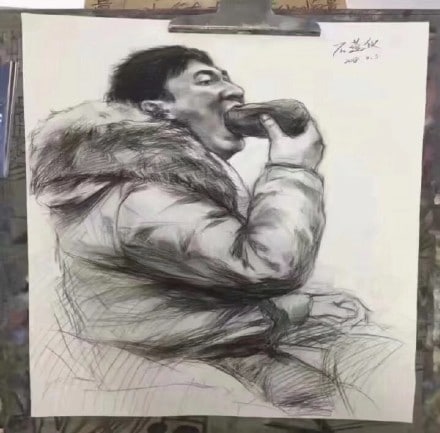



…but the meme also went from online to offline as some companies used it to promote their food or products.


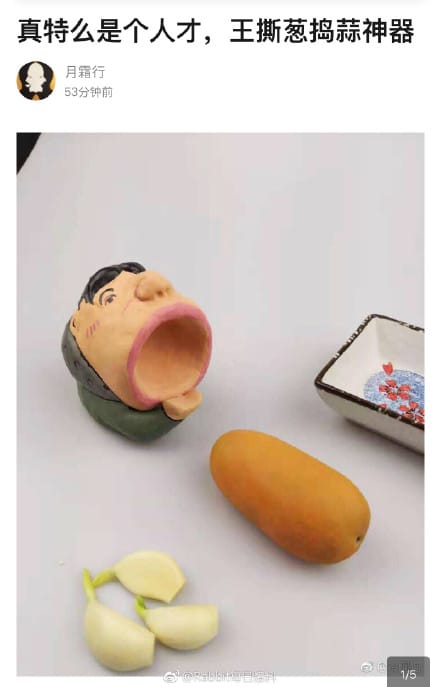
The trend went so far that the hashtag “Wang Sicong’s Hotdog-Eating Image” (#王思聪吃热狗头像#) received over 380 million views, and that the businessman even asked his followers on Weibo to stop sharing his hotdog picture.
As reported by Radii, Wang Sicong also went viral for revealing that he would be selecting 113 fans (11.3 is the date IG won) to receive 10,000RMB ($1440) each, choosing the winners on 11.11 Single’s Day.
![]()
At time of writing, that post had attracted a staggering 17 million comments.
But there were also other types of memes on Weibo this week, namely, those making of fun of the many people who had never heard of IG before and were surprised with the online craze surrounding the championship.
Netizens used self-irony in depicting themselves feeling like some kind of Neanderthal when hearing people discussing the IG championship…

Or by depicting two monkeys with a big “Congratulations IG” above them and one wondering “What is IG?!”, and the other telling him just to follow the rest in congratulating them anyway.

This response also shows that China’s post-70s and post-80s are not as familiar with the latest esports craze as China’s younger (post-90s, post-00s) generations are.
A Momentous Victory
The enormous hype over the World Championship of the Chinese team shows that there is more to the topic than the victory the five IG players alone. Many esports fanatics see the Chinese teams’ success as a crucial moment of recognition of esports in the PRC.
After IG was crowned world champion, the hashtag “What the Championship of IG Means” (#IG夺冠的意义#) received over 530 million views, with many Weibo users liking and sharing the following text:
“Perhaps middle-aged and elderly people don’t know what just happened, but the Chinese team won the LPL world championship. After seven unsuccessful years, the Chinese teams have been under tremendous pressure from the public. […] But now IG is the world champion. Why do people hear the cheers of young people outside? Because we are the teenagers that were never understood, but now at this very moment, we got our recognition.”
In conclusion, some facts & numbers:
● The first professional League of Legends world competition was held in 2011 in Sweden.
● League of Legends is considered to be the largest electronic sport in the world, being the most played game in the world for three consecutive years since 2016.
● In 2018, an estimated 81 million people worldwide played League of Legends each month.
● During the 2018 world final, a record was set with 205,348,063 viewers watching the game at the same time. 203.389.444 of these viewers were Chinese.
● The total prize money of the 2018 LPL world championship was $2,250,000.
● The 12 Chinese competing players altogether earned $556,875 prize money.
● Invictus Gaming won $843,750 prize money. The money was divided equally amongst a total of six players, meaning every player earned $140,625. (Note: the team also received bonuses from other third parties).
By Gabi Verberg and Manya Koetse, with contributions from Miranda Barnes
Follow @whatsonweibo
Spotted a mistake or want to add something? Please let us know in comments below or email us.
©2018 Whatsonweibo. All rights reserved. Do not reproduce our content without permission – you can contact us at info@whatsonweibo.com.
Gabi Verberg is a Business graduate from the University of Amsterdam who has worked and studied in Shanghai and Beijing. She now lives in Amsterdam and works as a part-time translator, with a particular interest in Chinese modern culture and politics.

China ACG Culture
Beyond the Box Office: What’s Behind Ne Zha 2’s Success?
The impact of Ne Zha 2 goes beyond box office figures—yet, in the end, it’s the numbers that matter most.
Published
2 months agoon
February 27, 2025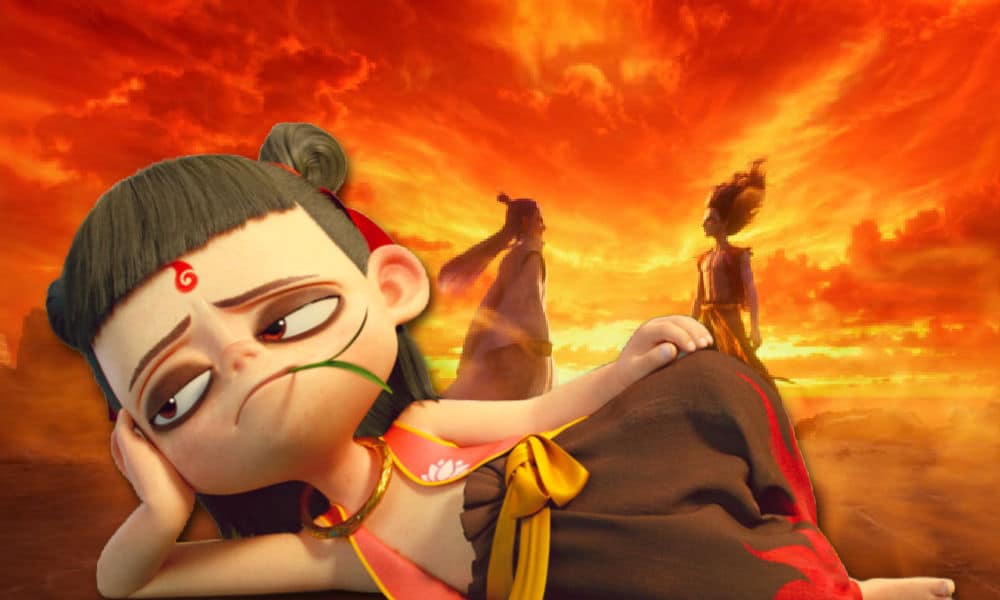
FROM THE WEIBO WATCH PREMIUM NEWSLETTER
These days, everybody is talking about Ne Zha 2 (哪吒2:魔童闹海), the recent hit film about one of China’s most legendary mythological heroes. With its spectacular visuals, epic battles, funny characters, dragons and deities, and moving scenes, the Chinese blockbuster animation is breaking all kinds of records and has gone from the major hit of this year’s Spring Festival film season to the 7th highest-grossing movie of all time and, with its 13.8 billion yuan ($1.90 billion USD) box office success, now also holds the title of the most successful animated film ever worldwide.
But there is so much more behind this movie than box office numbers alone. There is a collective online celebration surrounding the film, involving state media, brands, and netizens. On Weibo, a hashtag about the movie crossing the 10 billion yuan ($1.38 billion) milestone (#哪吒2破100亿#) has been viewed over a billion times. Social media timelines are filled with fan art, memes, industry discussions, and box office predictions.
The success of Ne Zha 2 is not just a win for China’s animation industry but for “Made in China” productions as a whole. Some argue that Ne Zha‘s triumph is not just cultural but also political, reinforcing China’s influence on the global stage and tying it to the ongoing US-China rivalry: after growing its power in military strength, technology, and AI, China is now making strides in cultural influence as well.
In a recent Weibo post, state broadcaster CCTV also suggested that Hollywood has lost its monopoly over the film industry and should no longer count on the Chinese market—the world’s second-largest movie market—for its box office dominance.
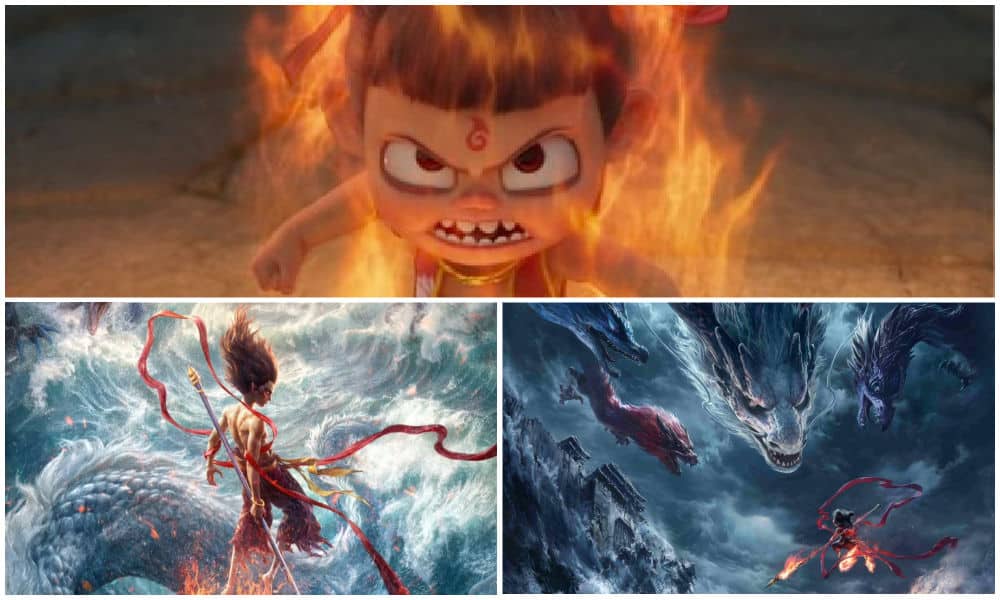
Various images from “Ne Zha 2” 哪吒2:魔童闹海
The success of Ne Zha 2 mainly resonates so deeply because of the past failures and struggles of Chinese animation (donghua 动画). For years, China’s animation industry struggled to compete with American animation studios and Japanese anime, while calls grew louder to find a uniquely Chinese recipe for success—to make donghua great again.
🔹 The Chinese Animation Dream
A year ago, another animated film was released in China—and you probably never heard of it. That film was Ba Jie (八戒之天蓬下界), a production that embraced Chinese mythology through the story of Zhu Bajie, the half-human, half-pig figure from the 16th-century classic Journey to the West (西游记). Ba Jie was a blend of traditional Chinese cultural elements with modern animation techniques, and was seen as a potential success for the 2024 Spring Festival box office race. It took eight years to go from script to screen.
But it flopped.
The film faced numerous setbacks, including significant production delays in the Covid years, limited showtime slots in cinemas, and, most importantly, a very cold reception from the public. On Douban, China’s biggest film review platform, many top comments criticized the movie’s unpolished animation and special effects, and complained that this film—like many before it—was yet another Chinese animation retelling a repetitive story from Journey to the West, one of the most popular works of fiction in China.
“Another mythological character, the same old story,” some wrote. “We’re not falling for low-quality films like this anymore.”
The frustration wasn’t just about Ba Jie—it was about China’s animation industry as a whole. Over the past decade, the quality of Chinese animation films has become a much-discussed topic on social media in China—sometimes sparked by flops, and other times by hits.
Besides Ba Jie, one of those flops was the 2018 The King of Football (足球王者), which took approximately 60 million yuan ($8.8 million) to make, but only made 1.8 million yuan ($267,000) at the box office.
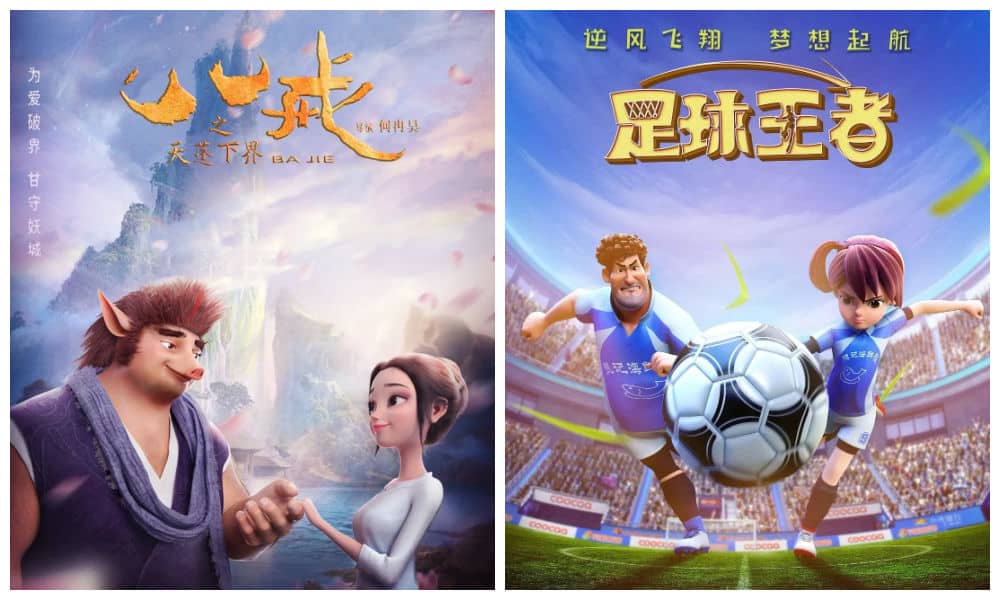
Both Ba Jie, which took years to reach the screen, and King of Football, a high-budget animation, ended up as flops.
One of those successes was the 2019 first Ne Zha film (哪吒之魔童降世), which became China’s highest grossing animated film, or, of the same year, the fantasy animation White Snake (白蛇:缘起), a co-production between Warner Bros and Beijing-based Light Chaser Animation (also the company behind the Ne Zha films). These hits
showed the capabilities and appeal of made-in-China donghua, and sparked conversations about how big changes might be on the horizon for China’s animation industry.
“The only reason Chinese people don’t know we can do this kind of quality film is because we haven’t made any good stories or good films yet,” White Snake filmmaker Zhao Ji (赵霁) said at the time: “We have the power to make this kind of quality film, but we need more opportunities.”
More than just entertainment, China’s animated films—whether successes or failures—have come to symbolize the country’s creative capability. Over the years, and especially since the widespread propagation of the Chinese Dream (中国梦)—which emphasizes national rejuvenation and collective success—China’s ability to produce high-quality donghua with a strong cultural and artistic identity has become increasingly tied to narratives of national pride and soft power. A Chinese animation dream took shape.
🔹 The “Revival” of China’s Animation Industry
A key part of China’s animation dream is to create a 2.0 version of the “golden age” of Chinese animation.
This high-performing era, which took place between 1956 and 1965, was led by the Shanghai Animation Film Studio. While China’s leading animators were originally inspired by American animation (including Disney’s 1937 Snow White and the Seven Dwarfs), as well as German and Russian styles, they were committed to developing a distinctly Chinese animation style—one that incorporated classical Chinese literature, ink painting, symbolism, folk art, and even Peking opera.
Some of the most iconic films from this era include The Conceited General (骄傲的将军, 1956), Why Crows Are Black (乌鸦为什么是黑的, 1956), and most notably, Havoc in Heaven (大闹天宫, 1961 & 1964). Focusing on the legendary Monkey King, Sun Wukong (孙悟空), Havoc in Heaven remains one of China’s most celebrated animated films. On Douban, users have hailed it as “the pride of our domestic animation.”
One of China’s most renowned animation masters, Te Wei (特伟), once explained that the flourishing of China’s animation industry during this golden era was made possible by state support, a free creative atmosphere, a thriving production system, and multiple generations of animators working together at the studio.
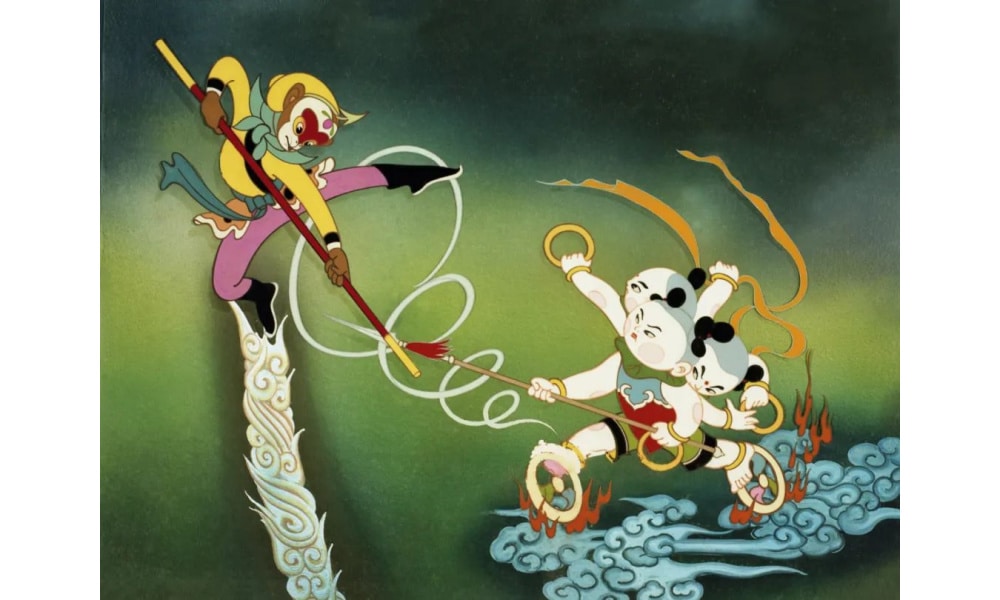
Still from Havoc in Heaven 大闹天宫 via The Paper.
➡️ So what happened to the golden days of Chinese animation?
The decline of this golden era was partly due to the political turmoil of the Cultural Revolution (1966–1976). While there was a second wave of successful productions in the late 1970s and 1980s, the industry lost much of its ‘magic touch’ in the 1990s and 2000s. During this period, Chinese animation studios were pressured to prioritize commercial value, adhere to strict content guidelines, and speed up production to serve the rising domestic TV market—while also taking on outsourcing work for overseas productions.
As the quality and originality of domestic productions lagged behind, the market came to be dominated by imported (often pirated) foreign animations. Japanese series like Astro Boy, Doraemon, and Chibi Maruko-chan became hugely influential among Chinese youth in the 1990s. The strong reaction in China to the 2024 death of Japanese manga artist Akira Toriyama, creator of Dragon Ball, also highlighted the profound impact of Japanese animation on the Chinese market.
This foreign influence also changed viewers’ preferences and aesthetic standards, and many Chinese animations adopted more Japanese or American styles in their creations.
However, this foreign ‘cultural invasion’ was not welcomed by Chinese authorities. As early as 1995, President Jiang Zemin reminded the Shanghai Animation Film Studio of the ideological importance of animation, emphasizing that China needed its “own animated heroes” to serve as “friends and examples” for Chinese youth.
By the early 2010s, the revitalization and protection of China’s animation industry became a national priority. This was implemented through various policies and incentives, including government funding, tax reductions and exemptions for Chinese animation companies, national animation awards, stipulations for the number of broadcasted animations that must be China-made. Additionally, there was an increased emphasis on animation as a tool for cultural diplomacy, focusing on how Chinese animation should reflect national values and history while maintaining global appeal.
It’s important to note that the so-called ‘rejuvenation’ of Chinese animation is not just a cultural and ideological project, there are economic motives at stake too: China’s animation industry is a multi-billion dollar industry.
🔹 “Are We Ne Zha or the Groundhogs?”
The huge success of Ne Zha 2 is seen as a new milestone for Chinese animation and as inspiration for audiences. The film took about five years to complete, reportedly involving 140 animation studios and over 4,000 staff members. The film was written and overseen by director Yang Yu (杨宇), better known as Jiaozi (饺子).
The story is all based on Chinese mythology, following the tumultuous journey of legendary figures Nezha (哪吒) and Ao Bing (敖丙), both characters from the 16th-century classic Chinese novel Investiture of the Gods (Fengshen Yanyi, 封神演义). Unlike Ba Jie or other similar films, the narrative is not considered repetitive or cliché, as Ne Zha 2 incorporates various original interpretations and detailed character designs, even showcasing multiple Chinese dialects, including Sichuan, Tianjin, and Shandong dialects.
One of the film’s unexpected highlights is its clan of comical groundhogs. In this particularly popular scene, Nezha engages in battle against a group of groundhogs (土拨鼠), led by their chief marmot (voiced by director Jiaozi himself). Amid the fierce conflict, most of the groundhogs are hilariously indifferent to the fight itself; instead, they are focused on protecting their soup bowls and continuing to eat—until they are ultimately hunted down and captured.
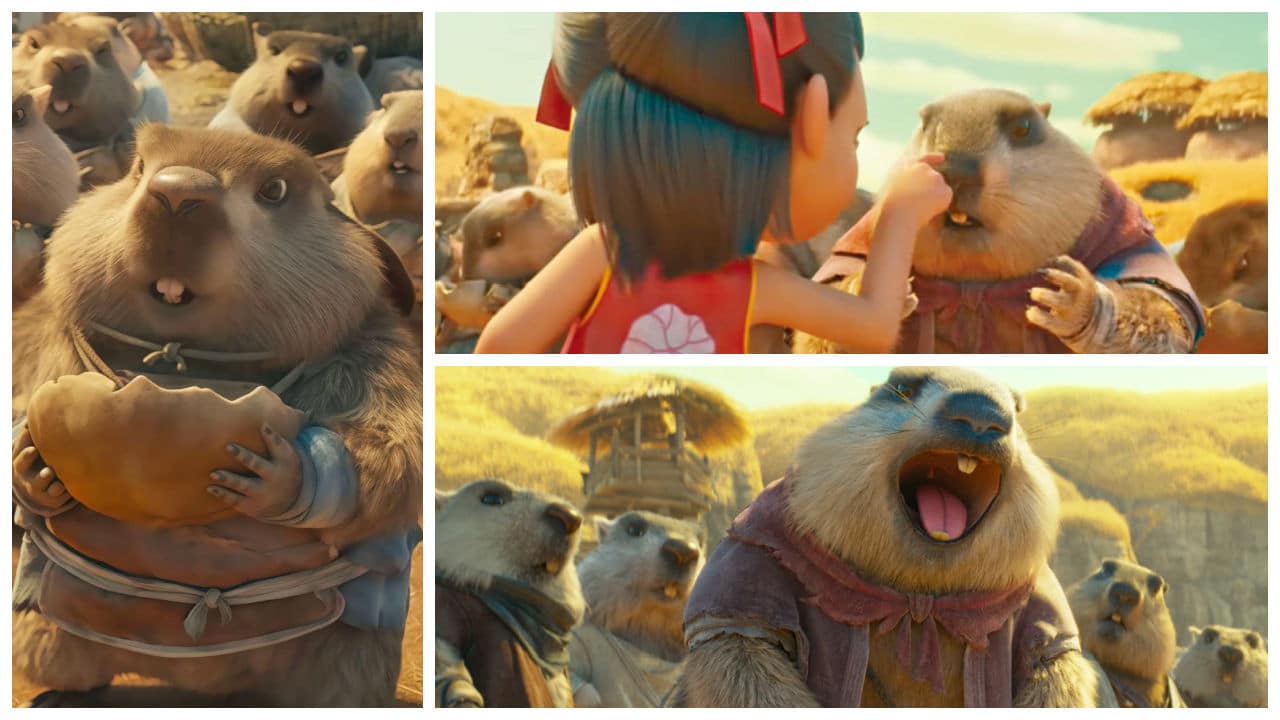
Nezha and the clan of groundhogs.
Besides fueling the social media meme machine, the groundhog scene actually also sparked discussions about social class and struggle. Some commentators began asking, “Are we Ne Zha or the groundhogs?”
Several blogs, including this one, argued that while many Chinese netizens like to identify with Nezha, they are actually more like the groundhogs; they don’t have powerful connections nor super talents. Instead, they are hardworking, ordinary beings, struggling to survive as background figures, positioned at the bottom of the hierarchy.
One comment from a film review captured this sentiment: “At first, I thought I was Nezha—turns out, I’m just a groundhog” (“开局我以为自己是哪咤,结果我是土拨鼠”).
The critical comparisons between Nezha and the groundhogs became politically sensitive when a now-censored article by the WeChat account Fifth Two-Six District (第五二六区) suggested that many Chinese people are so caught in their own information bubbles and mental frameworks that they fail to grasp how the rest of the world operates. The article said: “The greatest irony is that many people think they are Nezha—when in reality, they’re not even the groundhogs.”
While some see a parallel between Nezha’s struggles and their own hardships, others interpret the film’s success as a symbol of China’s rise on the global stage—particularly because the story is so deeply rooted in Chinese culture, literature, and mythology. This has led to an alternative perspective: rather than remaining powerless like the groundhogs, perhaps China—and its people—are transforming into the strong and rebellious Nezha, taking control of their destiny and rising as a global force.
Far-fetched or not, it’s an idea that continues to surface online, along with many other detailed analyses of the film. The nationalist Chinese social media blogger “A Bad Potato” (@一个坏土豆) recently wrote in a Weibo post:
“We were once the groundhog, but today, nobody can make us kneel!” (“我们曾经是土拨鼠,但是今天,没有任何人可以让我们跪下!”)
In another post, the blogger even dragged the Russia-Ukraine war into the discussion, arguing that caring too much about the powerless “groundhogs,” those struggling to survive, does not serve China’s interest. He wrote:
“(..) whether Russia is righteous or evil does not concern me at all. I only care about whether it benefits our great rejuvenation—whoever serves our interests, I support. Only the “traitors” speak hypocritically about love and justice. Speaking about freedom and democracy that we don’t even understand, they wish Russia collapses tomorrow but don’t care if that would lead to us being surrounded by NATO. So, in the end—are we Ne Zha, or are we the groundhog?”
One line from the film that has gained widespread popularity is: “If there is no path ahead, I will carve one out myself!” (“若前方无路,我就踏出一条路!”). Unlike the more controversial groundhog symbolism, this phrase resonates with many as a reflection not only of Nezha’s resilience but also of the determination that has been driving China’s animation industry forward.
The story of Ne Zha 2 goes beyond box office numbers—it represents the global success of Chinese animation, a revival of its golden era, and China’s growing cultural influence. Yet, paradoxically, it’s also all about the numbers. While the vast majority of its earnings come from the domestic market, Ne Zha 2 is still officially a global number-one hit. More than its actual reach worldwide, what truly matters in the eyes of many is that a Chinese animation has managed to surpass the US and Japan at the box office.
While the industry still has room to grow and many markets to conquer, this milestone proves that part of the Chinese animation dream has already come true. And with Ne Zha 3 set for release in 2028, the journey is far from over.
Want to read more on Ne Zha 2? Also check out the Ne Zha 2 buzz article by Wendy Huang here and our related Weibo word of the week here.
By Manya Koetse
(follow on X, LinkedIn, or Instagram)
Some of the research referenced in this text can also be found in an article I published in 2019: The Chinese Animation Dream: Making Made-in-China ‘Donghua’ Great Again. For further reading, see:
►Du, Daisy Yan. 2019. Animated Encounters: Transnational Movements of Chinese Animation, 1940s-1970s. Honolulu: University of Hawaii Press.
►Lent, John A. and Xu Ying. 2013. “Chinese Animation: A Historical and Contemporary Analysis.” Journal of Asian Pacific Communication 23(1): 19-40.
►Saito, Asako P. 2017. “Moe and Internet Memes: The Resistance and Accommodation of Japanese Popular Culture in China.” Cultural Studies Review 23(1), 136-150.
🌟 Attention!
For 11 years, What’s on Weibo has remained a fully independent platform, driven by my passion and the dedication of a small team to provide a window into China’s digital culture and online trends. In 2023, we introduced a soft paywall to ensure the site’s sustainability. I’m incredibly grateful to our loyal readers who have subscribed since then—your support has been invaluable.
But to keep What’s on Weibo thriving, we need more subscribers. If you appreciate our content and value independent China research, please consider subscribing. Your support makes all the difference.
Spotted a mistake or want to add something? Please let us know in comments below or email us. First-time commenters, please be patient – we will have to manually approve your comment before it appears.
©2025 Whatsonweibo. All rights reserved. Do not reproduce our content without permission – you can contact us at info@whatsonweibo.com.
China ACG Culture
“Black Myth: Wukong”: From Gaming Screens to the CMG Spring Festival Gala?
Published
3 months agoon
January 21, 2025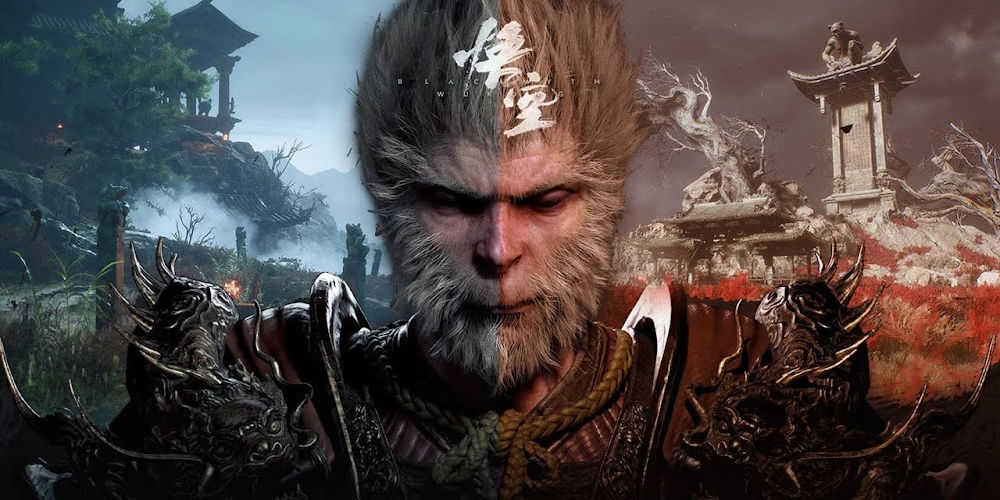
FROM THE WEIBO WATCH PREMIUM NEWSLETTER
Is Chinese game sensation ‘Black Myth Wukong’ making a jump from gaming screens to the CMG Spring Festival Gala? There’s already some online excitement over a potential performance at the biggest liveshow of the year.
The countdown to the most-watched show of the year has begun. On January 29, the Year of the Snake will be celebrated across China, and as always, the CMG Spring Festival Gala, broadcast on CCTV1, will air on the night leading up to midnight on January 28.
Rehearsals for the show began last week, sparking rumors and discussions about the must-watch performances this year. Soon, the hashtag “Black Myth: Wukong – From New Year’s Gala to Spring Festival Gala” (#黑神话悟空从跨晚到春晚#) became a topic of discussion on Weibo, following rumors that the Gala will feature a performance based on the hugely popular game Black Myth: Wukong.
Three weeks ago, a 16-minute-long Black Myth: Wukong performance already was a major highlight of Bilibili’s 2024 New Year’s Gala (B站跨年晚会). The show featured stunning visuals from the game, anime-inspired elements, special effects, spectacular stage design, and live song-and-dance performances. It was such a hit that many viewers said it brought them to tears. You can watch that show on YouTube here.
While it’s unlikely that the entire 16-minute performance will be included in the Spring Festival Gala (it’s a long 4-hour show but maintains a very fast pace), it seems highly possible that a highlight segment of the performance could make its way to the show.
Recently, Black Myth: Wukong was crowned 2024’s Game of the Year at the Steam Awards. The game is nothing short of a sensation. Officially released on August 20, 2024, it topped the international gaming platform Steam’s “Most Played” list within hours of its launch. Developed by Game Science, a studio founded by former Tencent employees, Black Myth: Wukong draws inspiration from the classic Chinese novel Journey to the West. This legendary tale of heroes and demons follows the supernatural monkey Sun Wukong as he accompanies the Tang Dynasty monk Xuanzang on a pilgrimage to India to retrieve Buddhist scriptures. The game, however, focuses on Sun Wukong’s story after this iconic journey.
The success of Black Myth: Wukong cannot be overstated—I’ve also not seen a Chinese video game be this hugely popular on social media over the past decade. Beyond being a blockbuster game it is now widely regarded as an impactful Chinese pop cultural export that showcases Chinese culture, history, and traditions. Its massive success has made anything associated with it go viral—for example, a merchandise collaboration with Luckin Coffee sold out instantly.
If Black Myth: Wukong does indeed become part of the Spring Festival Gala, it will likely be one of the most talked-about and celebrated segments of the show. If it does not come on, which we would be a shame, we can still see a Black Myth performance at the pre-recorded Fujian Spring Festival Gala, which will air on January 29.

Lastly, if you’re not into video games and not that interested in watching the show, I still highly recommend that you check out the game’s music. You can find it on Spotify (link to album). It will also give you a sense of the unique beauty of Black Myth: Wukong that you might appreciate—I certainly do.
By Manya Koetse
(follow on X, LinkedIn, or Instagram)
Spotted a mistake or want to add something? Please let us know in comments below or email us. First-time commenters, please be patient – we will have to manually approve your comment before it appears.
©2025 Whatsonweibo. All rights reserved. Do not reproduce our content without permission – you can contact us at info@whatsonweibo.com.
Subscribe

Aftermath of Suzhou Marathon’s “Pissing Gate”

Do You Know Who Li Gang Is? Anti-Corruption Official Arrested for Corruption

Chinese New Nickname for Trump Mixes Fairy Tales with Tariff War

China Trending Week 15/16: Gu Ming Viral Collab, Maozi & Meigui Fallout, Datong Post-Engagement Rape Case

China Reacts: 3 Trending Hashtags Shaping the Tariff War Narrative

“Dear Li Hua”: The TikTok/Xiaohongshu Honeymoon Explained

Beyond the Box Office: What’s Behind Ne Zha 2’s Success?

IShowSpeed in China: Streaming China’s Stories Well

15 Years of Weibo: The Evolution of China’s Social Media Giant

Tuning Into the Year of the Snake

TikTok Refugees, Xiaohongshu, and the Letters from Li Hua

“Black Myth: Wukong”: From Gaming Screens to the CMG Spring Festival Gala?

US-Russia Rapprochement and “Saint Zelensky”: Chinese Online Reactions to Trump’s Shake-Up

The ‘China-chic Girl’ Image and the Realities of China’s Competitive Food Delivery Market

Collective Grief Over “Big S”
Get in touch
Would you like to become a contributor, or do you have any tips or suggestions? Get in touch here!
Popular Reads
-

 China Insight12 months ago
China Insight12 months agoThe Tragic Story of “Fat Cat”: How a Chinese Gamer’s Suicide Went Viral
-

 China Digital11 months ago
China Digital11 months agoChina’s 2024 Gaokao Triggers Online Discussions on AI
-

 China Arts & Entertainment11 months ago
China Arts & Entertainment11 months agoSinging Competition or Patriotic Fight? Hunan TV’s ‘Singer 2024’ Stirs Nationalistic Sentiments
-

 China Brands, Marketing & Consumers12 months ago
China Brands, Marketing & Consumers12 months agoA Brew of Controversy: Lu Xun and LELECHA’s ‘Smoky’ Oolong Tea





ChongChing Mayor
November 12, 2018 at 4:48 pm
Lmao… what dose their victory have anything to do with you? You are still video-game-playing losers, awarding professional players by your money.